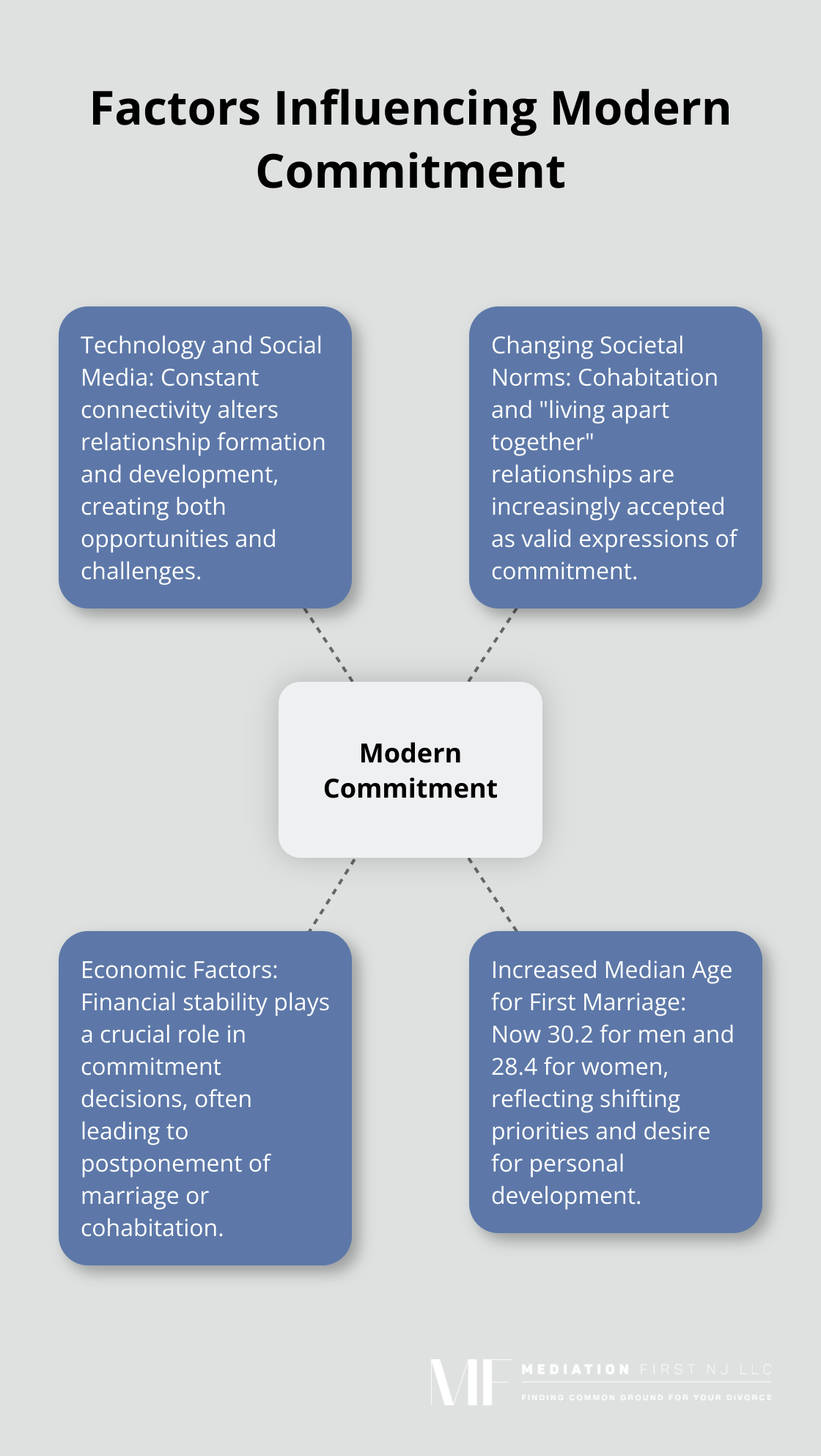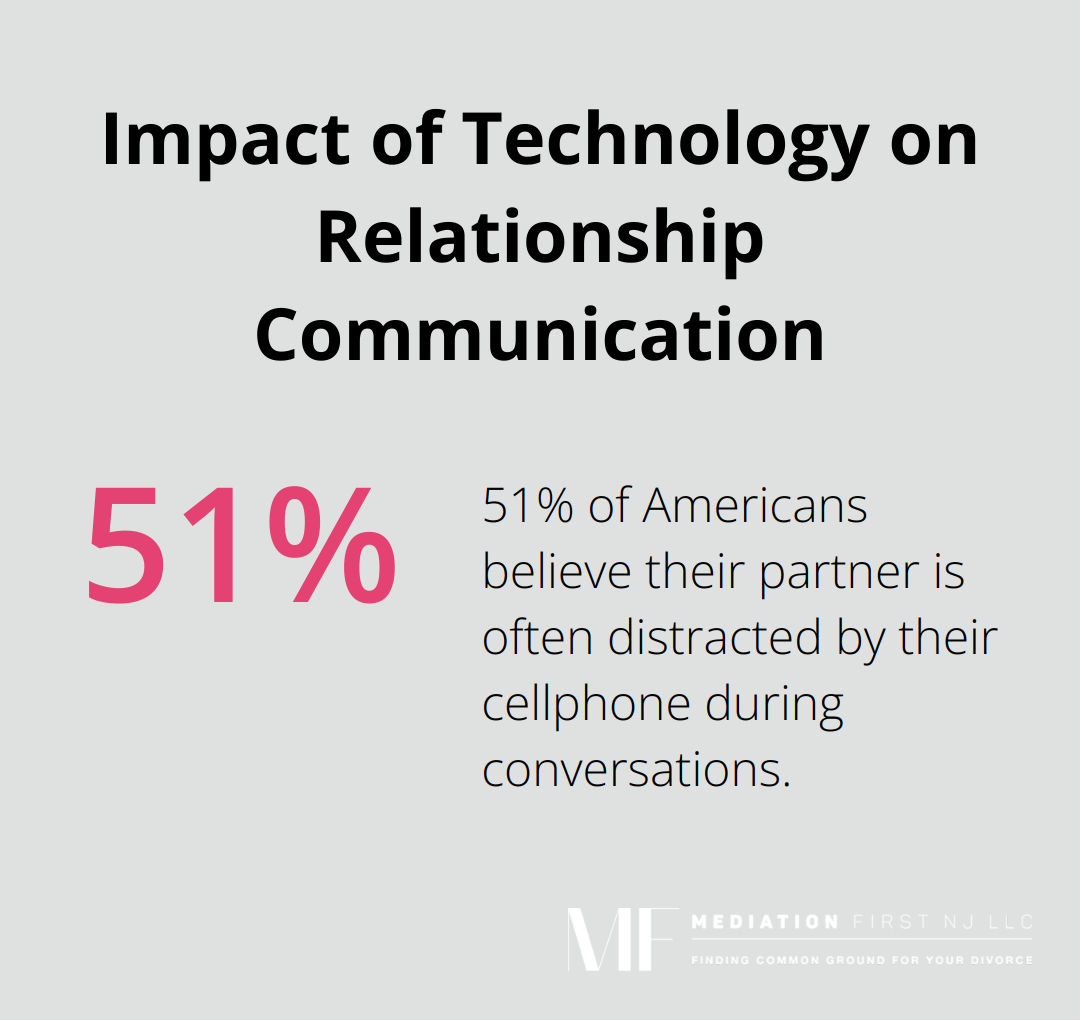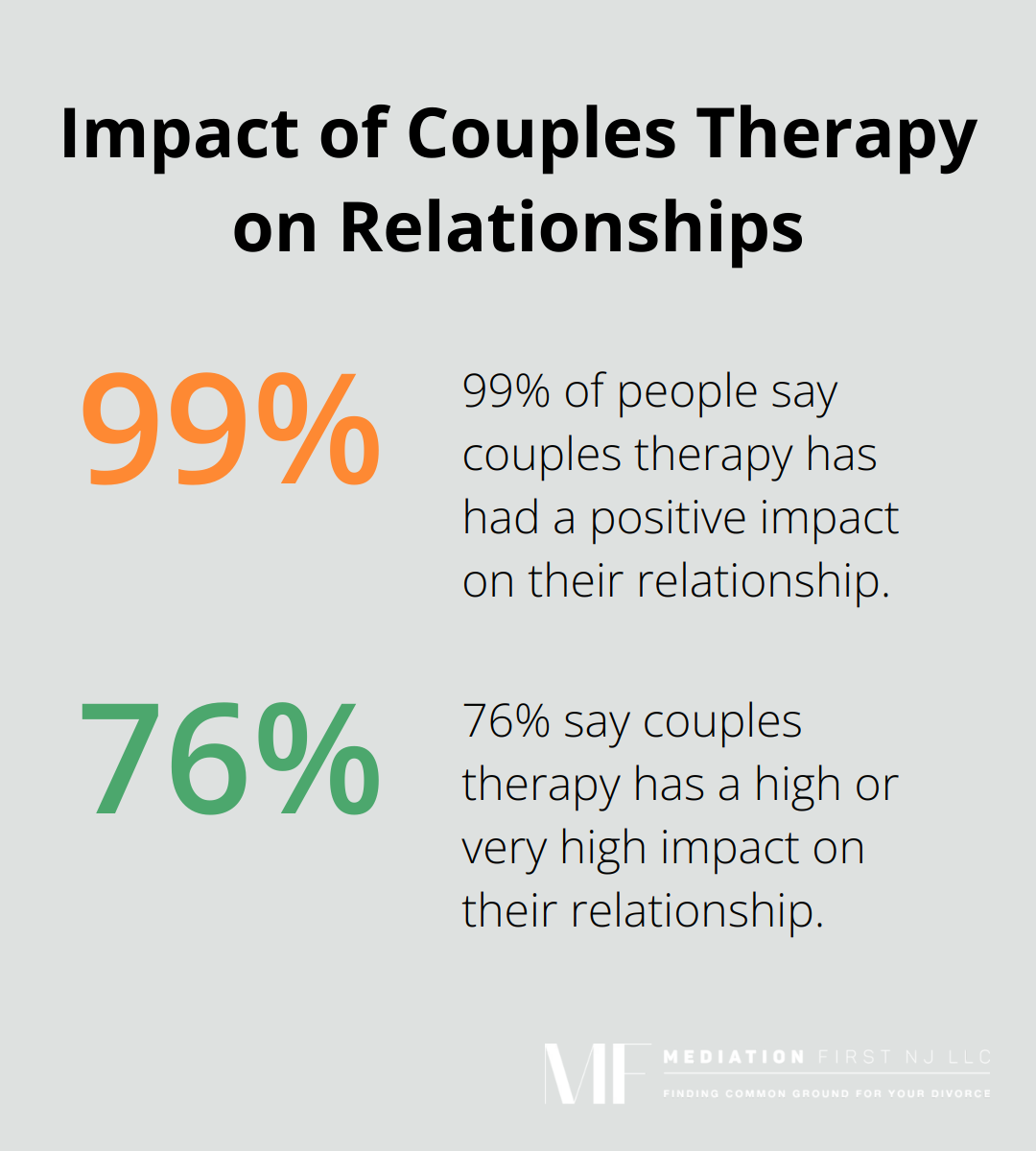Commitment in relationships has evolved significantly over the years, shaping the way we connect and build lasting partnerships. At Mediation First NJ LLC, we’ve observed how modern society’s dynamics have influenced the nature of commitment between couples.
In this post, we’ll explore the current state of relationship commitment, its benefits, and the challenges faced by couples today. We’ll also provide practical strategies for fostering stronger bonds in contemporary partnerships.
What Defines Commitment Today?
The Evolution of Commitment
Commitment in romantic relationships, generally defined as the intention to maintain a relationship over time, has transformed dramatically over the past few decades. At its core, commitment represents a conscious decision to dedicate oneself to a partner and work together towards shared goals. However, people now express and understand commitment in significantly different ways.
In the past, commitment often equated to marriage. Today, this is no longer the case. Most Americans find it acceptable for unmarried couples to live together, even for those who don’t plan to get married. This shift indicates that many now view cohabitation as a valid expression of commitment.
The rise of “living apart together” (LAT) relationships further illustrates commitment’s evolution. These arrangements allow partners to maintain long-term commitments while living separately, challenging traditional notions of committed relationships.
Factors Influencing Modern Commitment
Several factors shape how people approach commitment in today’s society:
- Technology and Social Media: Constant connectivity through smartphones and dating apps has altered relationship formation and development. While technology facilitates communication, it also creates distractions and temptations that test commitment.
- Changing Societal Norms: The U.S. Census Bureau reports that the median age for first marriage has increased to 30.2 for men and 28.4 for women. This delay reflects shifting priorities and a desire for personal development before long-term partnership commitments.
- Economic Factors: Financial stability plays a crucial role in commitment decisions. Many couples postpone marriage or cohabitation due to economic uncertainties or the desire to achieve career goals first.
The Necessity of Clear Communication
Given these changes, clear communication about commitment has become more critical than ever. Couples who openly discuss their expectations and intentions regarding commitment often navigate relationship challenges more successfully.

Partners must engage in honest conversations about what commitment means to them individually and as a couple. This clarity helps prevent misunderstandings and ensures both parties align on their relationship’s future.
Redefining Commitment in Modern Contexts
While traditional markers of commitment (such as marriage) remain important for many, alternative forms of commitment continue to gain acceptance. Cohabitation, long-distance relationships, and non-traditional partnership structures all represent valid expressions of commitment for different couples.
The key lies in mutual understanding and agreement between partners. What matters most is not the external form of commitment, but the internal dedication and shared vision that partners cultivate together.
As we move forward, it’s essential to recognize that commitment, while evolving, remains a cornerstone of strong relationships. In the next section, we’ll explore the tangible benefits that commitment brings to modern partnerships.
Why Commitment Matters in Modern Relationships
Enhanced Emotional Security
Committed relationships provide a sense of emotional safety. When partners dedicate themselves to each other, they create an environment where both individuals feel secure expressing their feelings and vulnerabilities. This security fosters trust, allowing couples to navigate life’s challenges together with confidence.
A study by the National Marriage Project found that husbands and wives who had regular date nights reported better communication, more commitment, and greater sexual satisfaction. This emotional stability can positively impact mental health, work performance, and other areas of life.
Improved Communication and Conflict Resolution
Commitment encourages partners to invest time and effort in improving their communication skills. When couples focus on their relationship’s longevity, they work on expressing themselves clearly and listening actively to their partner.
Research from the Gottman Institute shows that repair is a key principle for a lasting relationship that allows couples to recover from arguments. These efforts prove crucial for long-term relationship success and satisfaction.
Shared Growth and Goal Achievement
Committed relationships provide a supportive framework for personal and shared growth. Partners in committed relationships often motivate each other to pursue individual goals while also working towards shared aspirations.
A longitudinal study by the University of California, Berkeley found that couples who reported high levels of commitment achieved their personal and shared goals over time more often. This mutual support and shared vision can lead to greater life satisfaction and relationship fulfillment.
Financial Benefits and Stability
Commitment often translates to shared financial responsibilities and goals. The U.S. Bureau of Labor Statistics reports that married couples tend to have higher net worths and more stable financial situations compared to single individuals or those in less committed relationships.
This financial stability can reduce stress and provide a solid foundation for future planning (whether it’s buying a home, starting a family, or planning for retirement).
Partners who commit to each other work together more effectively to overcome financial obstacles, leading to stronger, more resilient relationships.
Long-term Health Benefits
Research consistently shows that individuals in committed relationships enjoy better physical and mental health outcomes. A study published in the Journal of Marriage and Family found that married individuals (particularly men) reported better overall health and lower rates of depression compared to their unmarried counterparts.
Committed partners often encourage each other to maintain healthy habits (such as regular exercise and balanced diets) and provide emotional support during times of stress or illness. This mutual care and support can contribute to longer lifespans and improved quality of life.
While the benefits of commitment in relationships are clear, many couples today face unique challenges in maintaining strong partnerships. In the next section, we’ll explore some of these obstacles and discuss strategies for overcoming them in the context of modern relationships.
Navigating Commitment Hurdles in Modern Relationships
The Double-Edged Sword of Technology
Technology has revolutionized communication but created new obstacles for committed relationships. A Pew Research Center study found that 51% of Americans believe their partner is often distracted by their cellphone during conversations. This constant connectivity can lead to emotional disconnection and reduced quality time together.

We recommend implementing tech-free zones or times in your relationship. For example, establish a rule of no phones during dinner or in the bedroom. This simple change can significantly improve your ability to connect and communicate effectively.
Shifting Societal Expectations
Today’s society often emphasizes individual achievement and personal fulfillment over long-term commitment. The U.S. Census Bureau reports that the median age for first marriage has risen to 30.2 for men and 28.4 for women, reflecting a trend towards prioritizing career and personal goals before settling down.
While personal growth is important, it’s essential to find a balance between individual pursuits and relationship commitment. We suggest regular check-ins with your partner to discuss your shared vision for the future and how you can support each other’s goals within the context of your relationship.
Overcoming Fear and Past Traumas
Many individuals carry emotional baggage from past relationships or childhood experiences, making it difficult to fully commit to a new partner. A survey by Worthy found that 64% of divorced women reported emotional abuse as a reason for their divorce, highlighting how past traumas can impact future relationships.
We strongly recommend seeking professional help (such as couples therapy or individual counseling) to address these concerns. Working through past traumas can significantly improve your ability to form healthy, committed relationships. In fact, 99% of people say it has had a positive impact on their relationship, and three out of four (76%) say it has a high or very high impact.

The Challenge of Maintaining Long-Term Interest
In an era of instant gratification and endless options, some individuals struggle to maintain interest in a long-term relationship. A study published in the Journal of Sex & Marital Therapy found that boredom was a significant predictor of decreased relationship satisfaction.
To combat this, we encourage couples to actively work on keeping their relationship fresh and exciting. Try new activities together, plan regular date nights, or take up a shared hobby. The key is to continue investing time and effort into your relationship, even after the initial honeymoon phase has passed.
Navigating Financial Stress
Money matters can put significant strain on relationships. A survey by Ramsey Solutions found that money is the number one issue married couples fight about, and it’s also a leading cause of divorce.
To address this, we recommend open and honest conversations about finances early in your relationship. Create a shared budget, set financial goals together, and be transparent about your spending habits. If needed, consider seeking advice from a financial planner to help align your financial strategies with your relationship goals. By prioritizing financial transparency and communication, couples can build stronger, more resilient relationships.
Final Thoughts
Commitment in relationships remains a cornerstone of strong, lasting partnerships, even as its expression evolves in our modern world. Open and honest communication proves paramount to foster commitment in modern partnerships. Regular check-ins about relationship goals, expectations, and concerns can prevent misunderstandings and strengthen bonds.
Creating tech-free zones or times can help partners stay present and connected. Professional help, such as couples therapy or individual counseling, can address past traumas and fears (which is invaluable in deepening commitment). Financial transparency and shared financial planning can also reduce relationship stress and build a foundation for a secure future together.
We encourage you to reflect on your own commitment levels in your relationships. Mediation First NJ LLC understands the complexities of modern relationships and the challenges couples face in maintaining strong commitments. Our professional mediation services offer a supportive environment for couples to address their concerns, improve communication, and work towards mutually beneficial solutions.

